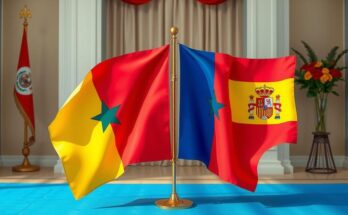Mozambique is conducting its presidential elections where about 17 million registered voters will choose successors to President Filipe Nyusi. The ruling Frelimo party’s candidate, David Chapo, faces competition from independent candidate Venacio Mondlane and others as they address pressing issues such as insurgency, food insecurity, and economic challenges. Voting will take place over a single day, with results determined within a 15-day period post-election.
Mozambique is set to hold its presidential election on Wednesday, a pivotal event as the nation prepares to choose a successor to President Filipe Nyusi, who has completed two terms in office. Approximately 17 million registered voters in the country, which has a population of around 31 million, are eligible to vote not only for the presidential position but also for 250 parliamentary seats and various provincial assemblies. While the ruling Front for the Liberation of Mozambique (Frelimo) is anticipated to maintain its grip on power, multiple candidates are campaigning amidst significant challenges, including a persistent jihadist insurgency in the northern regions and extreme climate threats affecting the lengthy Indian Ocean coastline. Currently, over 1.3 million individuals have been displaced due to this insurgency, coupled with hardships faced by millions more afflicted by severe food shortages caused by drought conditions. In the context of the election, the ruling party’s candidate is David Chapo. The 47-year-old former governor of Inhambane province is viewed as a strong contender, promoting the tourism sector which is vital to Mozambique’s economy. Chapo’s primary rival appears to be Venacio Mondlane, a 50-year-old independent candidate who combines his expertise as a banker and forestry engineer with a campaign centered on the slogan “Save Mozambique, this country’s ours.” Mondlane is allied with the Optimistic Party for the Development of Mozambique (Podemos), formed by dissidents from Frelimo. His previous candidacy in local elections resulted in allegations of electoral fraud, asserting that he should have won. Additionally, Lutero Simango represents the Democratic Movement of Mozambique, a party focused on addressing youth issues related to inequality and employment. The opposition is further underscored by the participation of Ossufo Momade of Renamo, who succeeded Afonso Dhlakama following his death in 2018. Key issues dominating the electorate’s concerns include ongoing violence from an Islamic State-affiliated group that has carried out attacks in Cabo Delgado province since 2017, leading to widespread displacement and destruction of community infrastructure. Candidates from various parties have expressed their commitment to tackling these crises, which are also worsened by economic concerns, including high unemployment rates and hunger exacerbated by severe climate events. Frelimo’s administration has been marred by accusations of corruption, notably the “tuna bond” scandal, where previous financial malfeasance resulted in Mozambique incurring $2 billion in concealed debt, prompting the International Monetary Fund to suspend financial support. Election day will consist of a single day of voting, with vote counting commencing immediately thereafter. Initial results will be released progressively, while the National Election Commission will formalize the results within 15 days. The Constitutional Council will then validate the results, with provisions for parties to contest any perceived discrepancies.
Mozambique’s political landscape has faced challenges that shape its upcoming presidential election. The ruling Frelimo party has held power since the country gained independence in 1975. The nation is currently grappling with a jihadist insurgency in the north, leading to massive displacements and food insecurity. This insurgency exacerbates existing socio-economic issues, creating a complex backdrop for the electoral cycle. Previous elections have been tainted by allegations of fraud, contributing to public disillusionment. Candidates are responding to pressing social and economic challenges, trying to present viable alternatives to the electorate. The significance of the election is underscored by the potential for new leadership amidst ongoing crises.
The presidential election in Mozambique represents a critical juncture for the nation as it seeks to navigate pressing social, economic, and security challenges. With a potential shift in leadership looming, the competing candidates, especially David Chapo and Venacio Mondlane, are articulating their visions for the future in the context of political continuity and the desire for change. The outcome of this election could greatly impact the trajectory of governance, stability, and development in Mozambique.
Original Source: apnews.com




